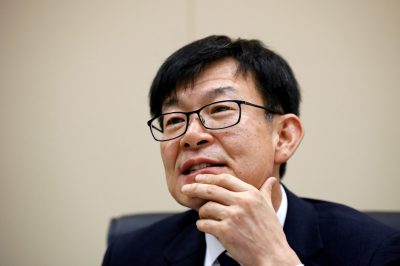In contrast to Moon’s proposal, the opposition parties (especially the main opposition right-wing Liberty Korea Party) have been advocating a semi-presidential system. In such a system, administrative functions and competences would be divided between a president elected by the people and a prime minister elected by the National Assembly (the prime minister is currently appointed by the president and merely confirmed by the National Assembly).
Moon’s proposal rejects, as does his ruling Democratic Party of Korea, the opposition parties’ call to allow the National Assembly to appoint or recommend the prime minister. Similarly, the opposition parties have shown ‘no signs of willingness to cooperate’ with Moon’s push to hold a national referendum on constitutional reform at the same time as the forthcoming general elections on 13 June 2018.
Politicians across the political spectrum agree that their country’s five-year, single-term presidency is well overdue for reform. Many believe that the current 1987 Constitution and the established power structures based on it grant far-flung and difficult to check powers to the nation’s ‘imperial presidency’. The dramatic ousting of former president Park Geun-hye from office concretely demonstrated not just her flawed imperial presidency but also the overwhelming public demand for democratic and corporate reforms — both of which Moon promised to deliver during his presidential campaign.
Moon has so far succeeded in retaining an approval rating of 70 per cent or more, which he has achieved mainly by eliminating what he called ‘the culture of the authoritarian president’ through the prosecution of Park Geun-hye and another conservative former president Lee Myung-bak, as well as a total of some 60 former high-ranking officials under them. Though these tsunami-like arrests and indictments have appeased many South Koreans, this does not mean that Moon will be able to push his ambitious proposal to amend the Constitution through political and institutional roadblocks without due process.
The most obvious roadblock is the extreme differences in direction and goal of constitutional reform between Moon’s Democratic Party of Korea and the opposition parties. Moon and the Democratic Party of Korea must actively negotiate — not just with the smaller opposition parties but also with the main Liberty Party of Korea — by agreeing to focus on eliminating South Korea’s political culture of the ‘authoritarian president’.
Park Geun-hye’s unexpected downfall ironically precipitated the perfect timing and ready-made rationale for such constitutional revision. Moon needs to seize the moment and convince the South Korean people, especially the older generations, who tend to be sceptical of Moon’s populist presidency itself and his equally populist constitutional amendment bill. They suspect the bill may merely pretend to eliminate the ‘authoritarian president’ culture and will actually inflate Moon’s own presidential power by expanding the power of the Blue House.
The National Assembly is required to vote on the proposed constitutional amendment bill by 24 May and, if approved by more than 196 of 300 lawmakers, Moon intends to put it to a national referendum during the general elections. The Liberal Party of Korea alone has 116 seats and can thus put a stop to Moon’s proposal. Unless there is miraculously decisive negotiation between the ruling and opposition parties, there appears little chance for Moon’s proposal to be put to a national referendum.
Challenging the ‘authoritarian presidency’ is not the only avenue that Moon is pursuing to improve checks and balances on South Korea’s rulers. In terms of chaebol (family-owned business conglomerate) reform, especially to stop the hitherto prevalent cosy relations between political and business elites, Moon has not only vowed to end the use of presidential pardons for corrupt corporate executives but has also appointed Kim Sang-jo, former corporate reform activist with the nickname ‘chaebol sniper’, as chairman of the Fair Trade Commission. Kim has wasted no time in pushing the largest corporate chaebols, including Samsung, Hyundai, LG and SK, to reform their companies’ governance structures to be more transparent and accountable while also changing their firms’ supply-chain pyramids, which in their current form the Korean people call gapjil — the bullying of firms lower down the hierarchy.
Despite these and other apparent changes under Moon’s newly adopted people-centred economic paradigm, the main political and institutional roadblock that the Moon government faces remains enforcement. South Korea already has most of the necessary rules and regulations in place (even though many loopholes abound). Although some commentators speculate that the chaebol system may well only last one generation more (since many of the powerful chaebols’ executives are slowly being replaced by a younger and more progressive generation of leaders), chaebols’ deeply entrenched dominance in South Korean society has given them sway far beyond what many observers would imagine over politics, the economy, the media and the judiciary.
This is not to say that South Korea’s judiciary is expected to be a major stumbling block in the process of corporate reform, unless the chaebols decide to challenge the legality of specific measures, in which case the judiciary may well side with the chaebols.
If Moon wants to fix corruption and restrained use of power in South Korea once and for all, he needs policies that can break through political and institutional roadblocks — doomed amendments and unenforced regulations will not be enough.
Hyung-A Kim is Associate Professor of Korean Politics and History at The Australian National University.

